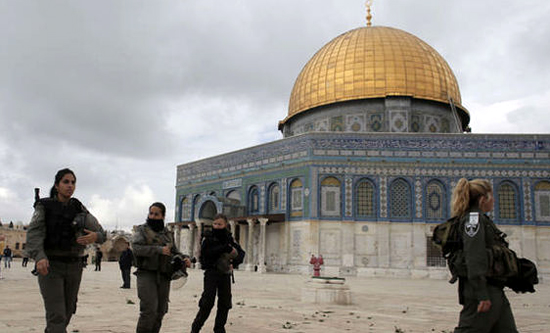
The Israeli state is in crisis.[1] The catalyst of this crisis has been the undefeated resistance across Palestine, steadfast in the face of continuing Israeli repression. Now the Netanyahu government is forcing an ‘Anti-Terrorism’ bill through the Knesset (parliament), increasing the occupation state’s repressive powers and criminalising a wide variety of resistance activities. This comes as a wave of violent incursions by the army and racist settlers attempts to impose Israel’s total control of the Al Aqsa mosque area. Palestinians are stepping up their protests against the Zionist colonisation of Jerusalem.
On 13 September Israeli forces launched a barbaric attack on Muslim worshippers in Al Aqsa, injuring nearly 100 Palestinians. IDF troops used tear gas, stun grenades and rubber bullets against the unarmed crowd. Earlier in the day Zionist settlers had forced their way into the Al Qibali mosque compound. They were led by Agricultural Minister Uri Ariel. Settlers and troops smashed windows and Israeli police invaded the mosque to arrest several worshippers. On 18 September Palestinians in the Old City fought back with petrol bombs and stones as Israel called up hundreds of border police reservists to force back protesters across Jerusalem and the West Bank. Youths resisted Israeli incursions into Bethlehem, Hebron, Qalandia and other sites.
On 21 September 19 year-old Hadeel al-Hashlamun, a 19-year-old student was shot and killed at point blank range at a checkpoint and Diyaa Abdul Halim Talahmeh, an Islamic Jihad volunteer, was killed resisting IDF troops in a confrontation in Hebron. In one week leading up to 22 September, 150 Palestinians were arrested, including some as young as 13, in raids and attacks on protesters. The protests are fuelled by Israeli restrictions on Al Aqsa, attempting to establish four-hour daily Muslim-free visiting hours for ultra-orthodox Jews. Israeli army manoeuvres around Al Aqsa have over the years sparked huge uprisings, most infamously with Ariel Sharon’s provocations at the Haram al Sharif in 2000, leading to the Second Palestinian Intifada.
There is huge symbolism in the Zionist invasions of Al Aqsa, Islam’s third holiest site, and the colonisers’ claims to historical religious rights to control it. But this is not a religious war. Ali Abunimah writes that, ‘The present struggle over Al-Aqsa is the consequence of Israel’s use of religious dogma as a cover for its violent settler-colonialism.’ The colonisation of Jerusalem is the ultimate aim of intransigent Zionists who want to see the city annexed to Israel and thus safeguard the Zionist state’s domination over the stateless Palestinians and other threats to its existence as a colonial entity. Current Israeli plans will see the Palestinian population of Jerusalem reduced to just 12 percent, ‘while the remaining 88 percent would be Jewish, with full Israeli sovereignty over all of Jerusalem, excluding the villages of Beit Hanina and other outlying areas.’ (Khalil Toufakji, Al Jazeera, 21/9/15)
On the outskirts, Beit Hanina suffered its first evictions in this process in 2012 and is now at the foot of a highly-built hilltop settlement building. There have been violent attacks on Palestinians in the area from settlers. In the Bedouin community of Jabal al Baba, 300 people face yet more displacement, as Israel attempts to connect the settlement zones around East Jerusalem to the huge Zionist colony of Ma’ale Adumim in the West Bank. According to the UN Office for the Coordination of Humanitarian Affairs, Israeli authorities have carried out around 370 demolitions of Palestinian property in occupied East Jerusalem and the West Bank since the start of 2015, forcing an estimated 432 residents out of their homes.
The 300,000 or so Palestinians in East Jerusalem are seen by Zionist law not as citizens, but as ‘permanent residents’ – this status can be revoked if it is found that Jerusalem is not their ‘centre of life’. In 2014 alone, 107 Palestinians were stripped of their residency status – including 56 women and 12 minors; since Israel’s 1967 capture of East Jerusalem, more than 14,400 Palestinian residents have also lost their rights to live in the city. 20,000 homes are under threat for not having planning permission. According to official statistics, 75.4% of all Palestinian residents in Jerusalem are living below the poverty line, including 84% Palestinian children. Only 41% of Palestinian children are enrolled in municipal schools and 45% of households have no connection to the Israeli-controlled water system.
The new Anti-Terror bill, which passed its first parliamentary hurdle in September, will mean a prison sentence for anyone expressing public support for ‘terrorist groups’ – in other words all Palestinian resistance factions – and will make anyone found guilty of ‘aiding terror’ a terrorist. Maximum sentences will be raised and families will be punished for the ‘crimes’ of their relatives.
Despite continuing resistance from Gaza to Jenin, Salman Abu Sitta, president of the Palestine Land Society says that the present situation ‘is also a sign of Israeli realisation that neither Palestinians nor Arabs have a determined leadership to defend Palestinian, Arab, and Muslim rights. This is a time of Israeli fanatic extremism at its height and the Arab defence at its lowest ebb’. A video of Palestinian Authority ‘security’ forces beating up a teenager in Al Azza refugee camp, Bethlehem, went viral. While PA chiefs attempt a cover-up, it is clear that Palestinians resisting the ‘anti-terror’ measures will have to find a new leadership.
Louis Brehony
[1] See ‘Israel-US split grows as Palestinians suffer’, FRFI 244, http://tinyurl.com/palfrfi244




